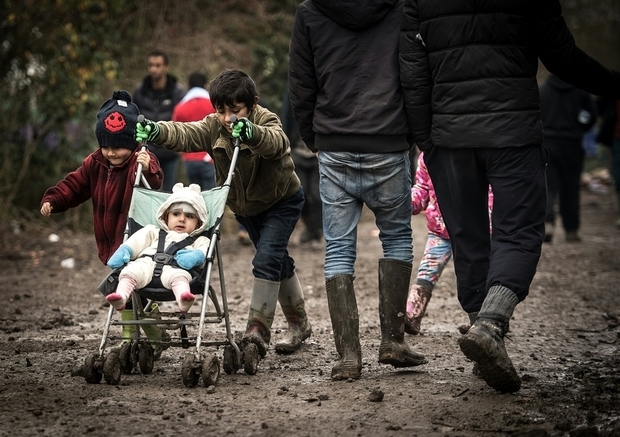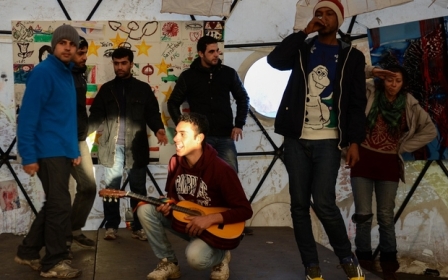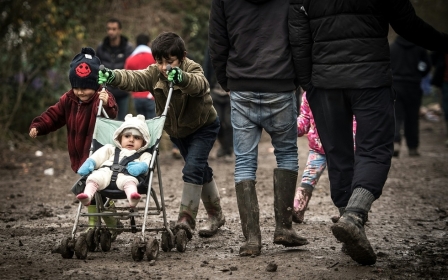Calais migrants in race to dodge bulldozers

In the freezing, mud-filled migrant camp known as "The Jungle," a dozen people carried a house down the street.
The residents of the camp in the northern French port of Calais are in a desperate race to save their makeshift homes from the bulldozers.
Local authorities warned them earlier in the week that they had just a few days to clear hundreds of shanties made from wooden planks and tarpaulin from the edge of the road that borders the camp.
Rumours have spread that bulldozers may show up in the middle of the night, but the authorities are remaining tight-lipped about what comes next.
"We asked them to give us enough time to prepare a new area and move the houses in a safe way," said Mohammed Adam, a doctor from Sudan who lives in the camp.
"But they said they would come here on Friday with their bulldozers and destroy everything. We have no time."
He shows his calloused hands, rubbed raw from two days of clearing bushes and flattening ground to make room for their relocated shacks.
"We will spend all night trying to move, and it is so cold," he said.
The migrants have been offered places in new refitted shipping containers, equipped with heating and sockets for electricity.
But only a few dozen can move each day and, in any case, very few want to go to the new container camp, fearing they could be permanently trapped there and unable to continue their desperate attempts to get across the Channel to Britain.
So, instead, they are carrying their makeshift shacks out of the bulldozers' target zone, one by one, as ice-cold wind and rain lash the camp.
Two charities - Auberge des Migrants and Acted - are helping to move the homes, either on flat-bed trailers pulled by one of three vans or simply lifting them by hand.
The aid workers are aware of the criticism that their assistance is discouraging people from abandoning the camp and heading for the government-built containers, but they say there is no choice.
"There are 2,000 people who risk their homes being bulldozed, and they are only taking 50 people a day into the containers, so what can we do?" said Tom Radcliffe, a British volunteer.
"We're moving them to what we hope is a safe zone. The government could have warned us ages ago, but instead they gave us three days. Why did they do that? They did it to scare the shit out of these people, who have already been through immense hardship."
The head of the group operating the new container camp, Stephane Duval, told AFP he expected 200 people to have moved into the containers by Thursday night and said he was "satisfied" with the progress.
But the migrants have expressed wariness of the new camp, particularly the hand-print scanners used to come and go - fearing that giving this data will stop them applying for asylum in Britain if they ever manage to smuggle themselves across the Channel.
"People do not come to the Jungle just to sleep and eat. They are here to try to get to England," said Sikander Noristany, 42, who represents the Afghan community in the camp. "They are worried it will be harder to do that from the containers because they look like a prison."
According to Didier Leschi, of the French Office for Immigration and Integration, if people want to leave the container camp they will have to explain why.
"It is not a hotel where you can just come and go," he said. "If people leave and places are empty and there are people waiting to get a place, that won't do."
Middle East Eye propose une couverture et une analyse indépendantes et incomparables du Moyen-Orient, de l’Afrique du Nord et d’autres régions du monde. Pour en savoir plus sur la reprise de ce contenu et les frais qui s’appliquent, veuillez remplir ce formulaire [en anglais]. Pour en savoir plus sur MEE, cliquez ici [en anglais].




